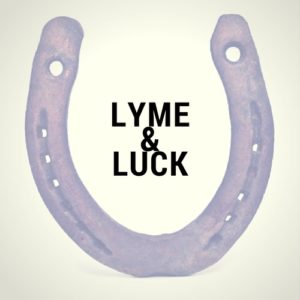
by Jennifer Crystal
For many Lyme disease patients, luck starts with getting an accurate diagnosis.
Whenever someone hears my story and says, “Wow, you’ve really been through the wringer,” I respond, “Yes, it was a long haul, but I feel really lucky.”
Eight years of misdiagnosis, three years in bed, one year on intravenous antibiotics, and countless missed life events doesn’t seem so lucky, but that’s not how I look at it now. I’m lucky that I was diagnosed at all. I’m lucky that I fell in the hands of a good Lyme-literate doctor (LLMD) and got treatment. I’m lucky that I lived in a state where insurance covered that treatment.
So much of Lyme disease is just luck, good and bad.
My medical trajectory started with the bad luck of being bitten by a tick. I was in the back woods of Maine. I wasn’t focused on prevention and wasn’t wearing bug repellent, and I definitely didn’t know to check for ticks. These are factors I could have better controlled, which might have kept that original tick away from me. Then again, I have lots of friends who spent similar summers in those woods, who were similarly careless, who were never bitten by a tick. So even if I had been more careful, my being bitten may have just been bad luck. The fact that my tick also delivered three co-infections in addition to Lyme was even worse luck.
Recognizing the role luck plays in Lyme disease lets us off the hook a little. I’m not saying we shouldn’t be vigilant; anyone who spends time outdoors must be. We need to take the best care of ourselves we can. We need to follow the protocols our doctors give us. When those treatments don’t work, or when we aren’t comfortable with our doctors, we need to do something about it: we need to find new physicians, or work with our practitioners to try different mixtures of medications. We need to figure out what lifestyle changes we can implement and adjunct therapies we can try to best improve our health. We need to do everything in our power to get an accurate diagnosis, to get proper treatment, and to fight for what we need.
And then we have to let go and realize, like to stoics, that the rest of it is out of our control. The rest of it is up to luck.
Patients who get an early accurate diagnosis are lucky. Patients who respond well to treatment are lucky. But all of us have some bad luck along the way. Some of the antibiotics I tried didn’t work, or had side effects I couldn’t tolerate. One made me so nauseous I spent a week running to the bathroom. Another caused gallstones so big that I had to have emergency surgery. It took a long time to find the right “cocktail” of medications, and even then, I had bad patches. I still have them, especially when I change a medication or hit a stressful period in my life.
But still, I am getting better. So in the larger picture, I consider myself lucky.
The most important thing is to get an accurate diagnosis, and the best way to do that is to see an LLMD. Patients write to me all the time with questions and fears, wondering if they’ll ever get better. If I read that they’re already seeing a Lyme specialist I breathe a sigh of relief. I know they are in good hands, and the best I can do is wish them good luck on their journey.
If you need help finding an LLMD, please click here. Then know that no matter how hard the road has been, no matter how hard it might be, luck is likely on your side.
 Opinions expressed by contributors are their own.
Opinions expressed by contributors are their own.
Jennifer Crystal is a writer and educator in Boston. She is working on a memoir about her journey with chronic tick-borne illness. Contact her at jennifercrystalwriter@gmail.com

GLA
Admin at GLA




-2.jpg)

